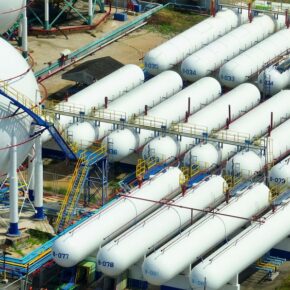
Posted on: 07. 23. 24
Natural gas has emerged as a vital energy source, playing a crucial role in meeting global energy demands. However, the extraction and processing of this resource have significant environmental implications. In this article, we delve into gas processing’s environmental effects and explore the best strategies to mitigate it. By understanding the challenges and adopting sustainable practices, we can ensure a more responsible and eco-conscious approach to gas processing.
Understanding the Environmental Impact of Gas Processing
The process of transforming raw natural gas into usable forms involves several stages, including extraction, transportation, and processing. Each of these stages can contribute to environmental degradation. Here are the key areas of impact:
Air Quality Concerns: Greenhouse Gas Emissions and Pollutants
Gas processing facilities release various air pollutants, including greenhouse gases (GHGs) like methane and carbon dioxide, volatile organic compounds (VOCs), and nitrogen oxides (NOx). These emissions contribute to climate change, smog formation, and respiratory problems.
Water Resource Management in Gas Processing
Water is used extensively in gas processing for cooling, cleaning, and other operational purposes. The discharge of wastewater can contaminate water sources with harmful chemicals, impacting aquatic ecosystems and potentially affecting human health.
Soil Contamination from Gas Processing Operations
Accidental spills or leaks during gas processing can contaminate soil with hydrocarbons and other hazardous substances. This contamination can have long-term consequences for soil fertility, plant growth, and groundwater quality.
Addressing Major Environmental Concerns in Gas Processing
The environmental concerns associated with gas processing demand urgent attention and proactive measures.
Mitigating Greenhouse Gas Emissions in Gas Processing
The release of GHGs, particularly methane, contributes significantly to global warming. Methane is a potent GHG with a much higher warming potential than carbon dioxide. Reducing methane emissions is crucial for mitigating climate change.
Water Usage and Contamination Challenges in Gas Processing
Gas processing requires substantial water resources, which can strain local water supplies, especially in water-scarce regions. Additionally, the improper disposal of wastewater can contaminate freshwater sources, posing risks to both ecosystems and human communities.
Waste Management and Disposal Issues in Gas Processing
Gas processing generates various types of waste, including drilling fluids, produced water, and solid waste. Inadequate waste management practices can lead to soil and water contamination, posing environmental hazards.
Regulatory Framework and Compliance in Gas Processing
Governments and regulatory bodies have established environmental regulations to control the impact of gas processing operations. These regulations often address emissions limits, water usage restrictions, and waste disposal requirements.
Compliance with these regulations is essential for minimizing the environmental footprint of gas processing. Companies are obligated to implement appropriate measures to monitor and control their environmental impact.
Mitigation Strategies for Reducing Environmental Impact
Fortunately, numerous strategies and technologies exist to mitigate the environmental impact of gas processing.
Technological Innovations for Cleaner Gas Processing
Advancements in gas processing technologies have led to more efficient and cleaner processes. For example, the use of closed-loop systems can significantly reduce water usage and minimize the risk of contamination.
Best Practices for Reducing Greenhouse Gas Emissions
Implementing best practices, such as leak detection and repair programs, vapor recovery units, and flaring reduction initiatives, can effectively curb emissions of GHGs and other pollutants.
Water Conservation and Treatment Solutions in Gas Processing
By adopting water conservation measures, such as recycling and reusing water, gas processing facilities can reduce their water footprint. Additionally, wastewater treatment technologies can remove contaminants and minimize the impact on water resources.
Sustainable Waste Management Practices in Gas Processing
Proper waste management is crucial for minimizing the environmental impact of gas processing. This includes responsible disposal of drilling fluids and produced water, as well as recycling or reusing solid waste whenever possible.
How Pro Gas Services LLC Can Help?
While the environmental impact of gas processing is a significant concern, there are numerous strategies and technologies available to mitigate these effects. By adopting sustainable practices, embracing technological innovations, and complying with environmental regulations, the gas processing industry can operate more responsibly and minimize its ecological footprint.
As a leading provider of gas processing equipment and solutions, Pro-Gas is committed to promoting sustainable practices in the industry. The company offers a wide range of products and services that can help mitigate the environmental impact of gas processing.
The Pro-Gas product line includes field gas conditioners, natural gas coolers, separators, and other equipment designed to optimize gas processing efficiency and minimize emissions. The company also provides vapor recovery units to capture and reuse VOCs, reducing air pollution.
By partnering with Pro-Gas LLC, operators can access cutting-edge technologies and expert guidance to implement sustainable practices in their gas processing operations. The company’s commitment to environmental stewardship aligns with the growing demand for responsible and eco-conscious solutions in the natural gas industry.
Pro Gas Services LLC is committed to supporting this transition towards sustainable gas processing by providing innovative solutions and expert guidance. Together, we can ensure a cleaner and greener future for the natural gas industry. If you’re interested in learning more about how Pro-Gas can help you mitigate your environmental impact, please contact us today.


